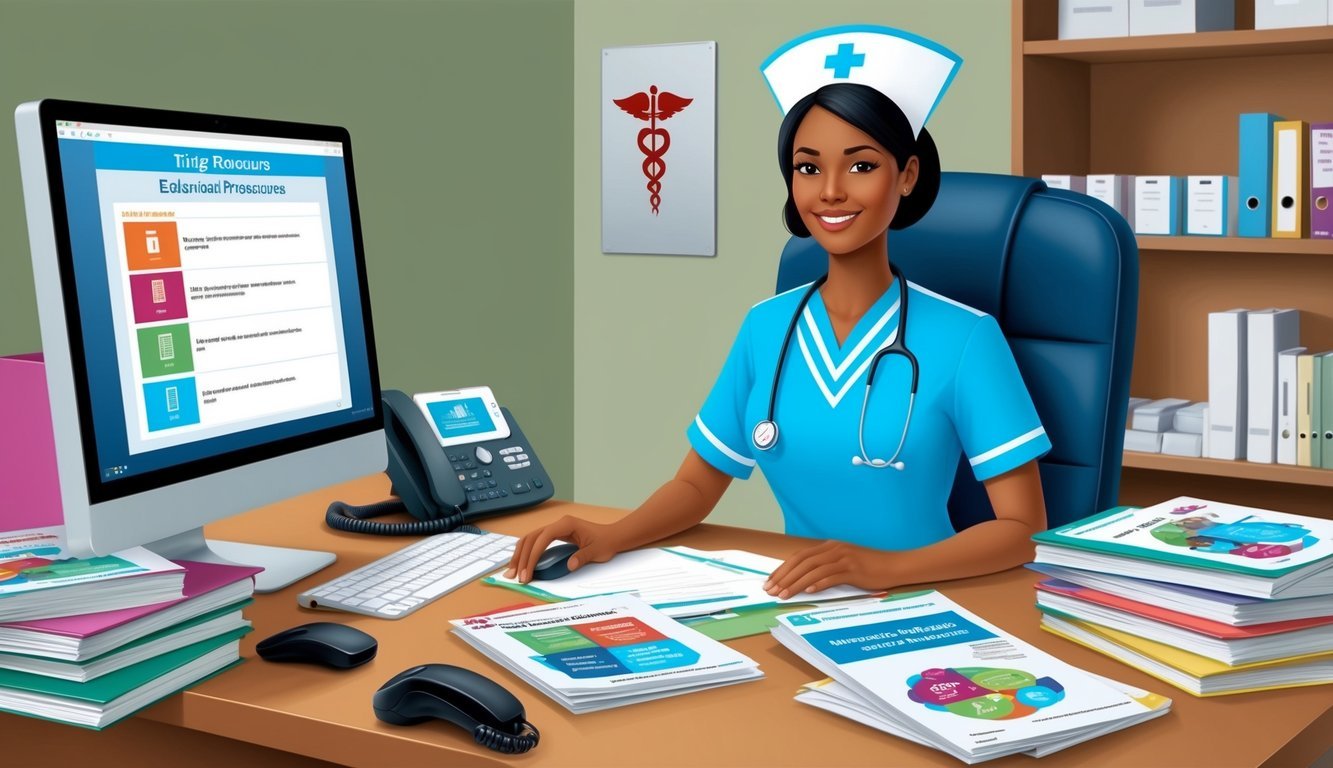Triage nursing is a critical role in healthcare that involves evaluating patient needs quickly and effectively.
To become a successful triage nurse, you must pursue specific educational pathways and develop core competencies in patient care.
This profession not only demands medical knowledge but also strong communication skills, as you will often be the first point of contact for patients in emergency situations.
As you explore this path, it is valuable to understand the various settings where triage nurses operate, from hospitals to telehealth environments.
Each setting presents unique challenges and opportunities for growth.
Embarking on this career can lead to advancements and various roles within the healthcare system, which can enhance your skills and increase your earning potential.
The journey to becoming a triage nurse is both rewarding and challenging.
By investing in your education and understanding your responsibilities, you can make a significant impact on patient care and emergency response.
Key Takeaways
- Triage nurses require specific education and training for effective patient care.
- Various settings offer unique opportunities for career advancement in triage nursing.
- Understanding the role can lead to higher earning potential and job satisfaction.
Educational Pathways

To become a successful triage nurse, you need to follow specific educational pathways.
This journey involves preparing in high school, pursuing nursing degrees, obtaining licensure, and participating in specialized training and certification programs.
High School Preparation
Your journey to becoming a triage nurse begins in high school.
Focus on subjects like biology, chemistry, and health sciences.
These courses lay the foundation for nursing knowledge.
You may also consider volunteering at healthcare facilities.
This experience can provide insight into patient care and the healthcare environment.
Being involved in extracurricular activities like health clubs can further enhance your understanding of the field.
It’s important to develop strong study habits and communication skills.
These attributes will benefit you throughout your nursing education and career.
Nursing Degrees
After high school, you must pursue a nursing degree.
You can choose between an Associate’s Degree in Nursing (ADN) or a Bachelor’s Degree in Nursing (BSN).
The ADN typically takes about two years to complete.
This program covers essential nursing concepts and prepares you for entry-level positions.
On the other hand, the BSN takes around four years and includes additional coursework in leadership and management.
Many employers prefer candidates with a BSN.
Whichever you choose, ensure the program is accredited.
This is crucial for your future nursing license and career opportunities.
Licensure
Once you complete your nursing degree, you need to obtain licensure to practice as a registered nurse (RN).
This involves passing the NCLEX-RN exam.
This standardized test assesses your knowledge and skills in nursing.
Preparing for the NCLEX-RN is crucial, as passing it is a requirement for getting your nursing license.
After passing the exam, check the licensing requirements in your state.
Each state has its own board of nursing, which manages licensure.
You will also need to complete continuing education to maintain your license over time.
Specialized Training and Certification
After becoming a licensed RN, consider specialized training in triage and emergency nursing.
This will enhance your skills and knowledge in triage roles.
Various organizations, like the American Nurses Credentialing Center, offer certifications specific to emergency and triage nursing.
These courses typically cover advanced assessment, triage protocols, and decision-making.
Completing these training programs not only improves your competency but also increases your job prospects.
You become a more valuable candidate for roles in emergency departments, where accurate triage is essential.
Investing in specialized education and certification can lead to a rewarding career in nursing.
Core Triage Nurse Competencies
Triage nurses play a crucial role in emergency healthcare settings.
Core competencies include clinical skills, effective communication, and the ability to work under pressure.
Each competency is vital for patient assessment, prioritizing care, and making critical decisions.
Clinical Skills and Patient Assessment
As a triage nurse, your clinical skills are essential for accurate patient assessment.
You must quickly evaluate symptoms, medical history, and vital signs.
Utilizing a triage algorithm helps prioritize patients based on the severity of their conditions.
Key aspects to focus on include:
- Rapid Assessment: Quickly determine whether a condition is life-threatening.
- Critical Thinking Skills: Analyze and interpret data to make informed decisions.
- Documentation: Maintain accurate and thorough records of patient information for effective ongoing care.
Your ability to perform these skills directly impacts the quality of patient care in the emergency department.
Communication and Decision-Making
Effective communication is vital in triage.
Your role involves sharing critical information with both patients and the healthcare team.
This means clearly explaining conditions and the urgency of care needed.
Key elements include:
- Active Listening: Understand patient concerns to provide the best care.
- Decision-Making: Utilize your clinical judgment to assign triage levels based on assessments.
- Collaboration: Work closely with other healthcare professionals to ensure coordinated efforts in patient care.
Your decisions must be timely and accurate, often made under pressure.
Working in High-Pressure Environments
Emergency departments are often chaotic, making your ability to handle stress important.
You must stay focused and organized to manage multiple patients needing urgent care effectively.
Key strategies for success include:
- Prioritizing Care: Use triage protocols to address the most critical needs first.
- Time Management: Efficiently allocate your time among patients to ensure thorough assessments.
- Adaptability: Be prepared for unexpected situations or changes in patient conditions.
Thriving under pressure ensures you provide the best emergency treatment and maintain a high standard of care in urgent situations.
The Role of Triage Nurses in Various Settings
Triage nurses play a crucial role in different healthcare environments.
Their main responsibility is to assess patient needs and prioritize care based on the severity of their conditions.
This can happen in various settings, including emergency departments, urgent care facilities, and through telehealth services.
Hospital Emergency Departments
In hospital emergency departments, triage nurses are the first point of contact for patients.
They evaluate each patient’s condition and decide how urgent their needs are.
This process helps to manage patient flow and ensure those needing immediate care receive it.
Triage nurses use tools like the Emergency Severity Index (ESI) to classify patients.
This helps in determining treatment plans and resources needed.
For instance:
| ESI Level | Description | Recommended Action |
|---|---|---|
| 1 | Resuscitation required | Immediate attention |
| 2 | High-risk situation | Requires prompt evaluation |
| 3 | Urgent but stable | Can wait a short time |
By accurately classifying patients, you help the department run smoothly and improve outcomes.
Ambulatory Care and Telehealth
In ambulatory care settings, triage nurses assess patients before they see a physician.
This may happen in urgent care clinics or through telehealth platforms.
Here, your role is vital in guiding patients to the appropriate level of care based on their symptoms.
Utilizing telemedicine tools allows for quick assessments and advice.
For example, when a patient calls with symptoms, you ask specific questions to determine the urgency of their condition.
This can lead to:
- Scheduled appointments for urgent issues
- Referrals to specialists
- Recommendations for self-care at home
Your communication skills are essential in providing reassurance and clear instructions.
Specialty Clinics and Crisis Response
In specialty clinics, triage nurses assess patients for specific health issues, like pain management or mental health concerns.
You work alongside various healthcare professionals to ensure patients receive focused and timely care.
In crisis response settings, such as poison control centers and crisis hotlines, your role shifts to providing immediate guidance.
You identify the severity of the situation and offer instructions for immediate action.
This could involve:
- Encouraging the caller to seek emergency help
- Providing first aid advice
Your ability to remain calm and collected in these situations is crucial for the safety and well-being of patients.
Career Advancement and Opportunities

As a triage nurse, various paths can enhance your career and increase your earning potential.
This section highlights options for continuing education, advanced roles, and unique opportunities within nursing.
Continuing Education and Professional Development
Investing in continuing education is essential to stay current in your field.
Many organizations offer certification courses that focus on skills relevant to triage nursing and emergency care.
You can explore programs such as the Emergency Severity Index (ESI) training, which helps improve patient assessment skills.
Additionally, institutions like ENA University provide specialized courses.
Other options include online courses and workshops that cover topics like crisis management and advanced communication skills.
These opportunities not only enhance your knowledge but can also lead to better job prospects and a higher triage nurse salary.
Advanced Nursing Roles and Leadership
With experience, you may gain access to advanced roles, such as a lead triage nurse or department supervisor.
In these positions, you can influence the workflow and impact patient care directly.
Pursuing a Bachelor of Science in Nursing (BSN) or a Master’s degree could open doors to these roles.
Advanced degrees may also allow you to become a telephone triage nurse, offering remote care and assessments.
These leadership roles often come with increased responsibilities but also higher salaries.
They provide a chance to mentor newer nurses and shape the future of nursing practice.
Non-Traditional Nursing Opportunities
Triage nursing can also lead to unique career paths outside traditional settings.
For instance, opportunities exist in medical response teams, where you can provide care during emergencies.
Roles in telehealth nursing are growing.
You might work from home, providing consultations and assessments through telecommunication.
This setup offers flexibility while still allowing you to impact patient care.
These non-traditional roles often come with competitive salaries and the chance to work in different environments, adding variety to your nursing career.
Exploring these options can significantly benefit your professional journey.
Understanding Triage Nurse Salary and Benefits

As a triage nurse, your salary can vary based on several factors, such as experience, location, and the healthcare system you work in.
Here’s a breakdown of average salaries from different sources:
| Source | Average Annual Salary |
|---|---|
| ZipRecruiter | $78,269 |
| Indeed | $73,707 |
| Salary.com | $66,441 |
| Salary.com (Higher Range) | $97,390 |
Triage nurses typically earn a competitive salary.
Factors like education level and area of specialization also play a role in your potential earnings.
In addition to salary, benefits can enhance your role as a triage nurse.
Many healthcare systems offer:
- Health insurance
- Retirement plans
- Paid time off
- Continuing education support
These benefits can contribute significantly to your overall compensation and job satisfaction.
Advancing your career as a triage nurse may lead to higher salaries and better benefits.
Pursuing additional certifications or specialization can increase your value within the healthcare system.
Frequently Asked Questions

If you are considering a career as a triage nurse, you might have specific questions about the necessary education, certifications, and responsibilities.
Here are some common inquiries answered clearly to help you understand the path to becoming a triage nurse.
What are the educational prerequisites for a triage nurse?
To become a triage nurse, you typically need a nursing degree.
This can be an Associate’s Degree in Nursing (ADN) or a Bachelor of Science in Nursing (BSN).
Many employers prefer candidates with a BSN.
You should also have clinical experience in emergency or critical care settings.
What certifications are required to practice as a triage nurse?
You may need to obtain certifications relevant to triage nursing.
Two valuable certifications are the Emergency Nurse Pediatric Course (ENPC) and the Trauma Nursing Core Course (TNCC).
Additionally, the Triage Nurse Certification offered by the Emergency Nurses Association can enhance your credentials.
How many years of study are typically needed to become a triage nurse?
Typically, you will spend about two to four years in education to become a registered nurse.
After that, gaining relevant clinical experience can take an additional one to three years, depending on your background and the job requirements.
What are the primary duties and responsibilities of a triage nurse?
Triage nurses assess patients’ conditions in emergency settings.
Your responsibilities include:
- Evaluating patients based on urgency.
- Documenting medical histories.
- Communicating with physicians and other healthcare staff.
- Prioritizing care based on the severity of conditions.
Is a specific degree mandatory to work as a triage nurse?
While there is no specific degree solely for triage nursing, holding a nursing degree is essential.
A BSN can provide a competitive edge in job applications, especially in larger hospitals.
What type of licensure must a triage nurse obtain to work professionally?
To work as a triage nurse, you must obtain a Registered Nurse (RN) license.
This involves passing the NCLEX-RN exam after completing your nursing education.
Make sure to check the licensing requirements in your state for any additional regulations.

